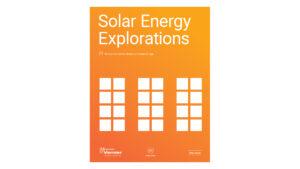Introduction to Solar Panels and Solar Energy
Experiment #2 from Solar Energy Explorations
- Education Level
- Middle School

Introduction
Solar energy is used in many different ways, such as providing heat and light in buildings, powering school zone speed signs, heating swimming pools, and charging electronic devices.
When we burn oil, natural gas, and coal to drive a car or heat a classroom, we are also using energy that came from the sun. Oil, natural gas, and coal were formed long ago from plants and animals. Plants use solar energy to grow and then store the energy in their roots and leaves. When animals eat the plants, they are consuming energy that came from the sun. When you ride in a car that runs on gas, you are using energy from the sun to travel.
Because it takes millions of years to form oil, natural gas, and coal, people are developing ways to use solar cells to quickly convert solar energy into electricity.
Solar cells are made of two thin pieces of silicon (an element that forms glass-like crystals) that are connected together. When radiant energy from the sun strikes the solar cell, energy is transferred to electrons in the silicon. When the solar cell is connected to a closed circuit, the electrons start to flow through the circuit.
A single solar cell can only convert a small amount of energy, so engineers connect many solar cells together to build a device called a solar panel.
Objectives
- Use electricity generated by a solar panel to make sound.
- Build and understand a basic circuit.
- Verify that energy is transferred by electric currents in a closed circuit.
Sensors and Equipment
This experiment features the following sensors and equipment. Additional equipment may be required.
Ready to Experiment?
Ask an Expert
Get answers to your questions about how to teach this experiment with our support team.
- Call toll-free: 888-837-6437
- Chat with Us
- Email support@vernier.com
Purchase the Lab Book
This experiment is #2 of Solar Energy Explorations. The experiment in the book includes student instructions as well as instructor information for set up, helpful hints, and sample graphs and data.


